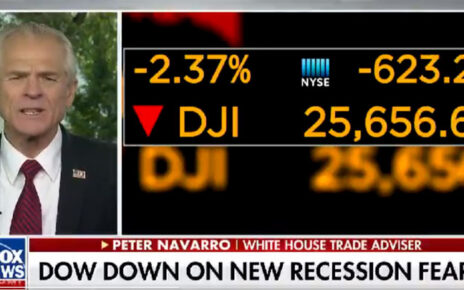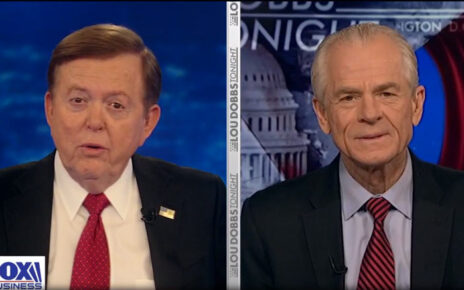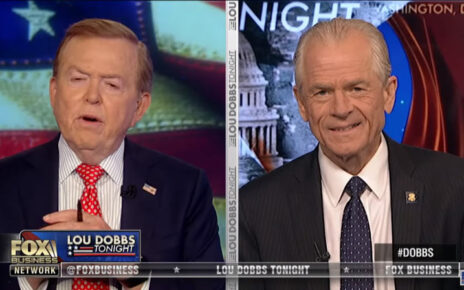CNN This Morning with Kasie Hunt on Twitter: “”The end game is clear: to have China stop engaging in these acts of economic aggression that cost us over 70,000 factories and over 5 million manufacturing jobs over the last decade,” says Peter Navarro, top trade adviser to Pres. Trump, about the administration’s trade policy pic.twitter.com/9zBFWQRtC6 / Twitter”
“The end game is clear: to have China stop engaging in these acts of economic aggression that cost us over 70,000 factories and over 5 million manufacturing jobs over the last decade,” says Peter Navarro, top trade adviser to Pres. Trump, about the administration’s trade policy pic.twitter.com/9zBFWQRtC6
TRANSCRIPT
So, joining us now is Peter Navarro. He’s the assistant to the president and director of the Office of Trade and Manufacturing Policy.
Mr. Navarro, we’re so happy to have you here with us to walk us through the president’s trade and economic policies and plans because it has been a bumpy, nerve-racking week for some people as you know watching the stock market and bond market. In fact, as you know, “The Wall Street Journal” editorial board seized on this and said, Mr. Trump’s willy-nilly trade offensive could be a mistake that turns a slow down into the Navarro recession.
Your response?
PETER NAVARRO, DIRECTOR OF TRADE AND MANUFACTURING POLICY: Yesterday, Alisyn, on your show about this time you made three claims on the set. Basically that we didn’t have a clear economic plan, that our trade plan was not coherent, and then somehow the strong and wise decision we’d made on the tariffs on China was problematic.
So let me walk through those real quickly. First of all, you have to understand the DNA of the Trump campaign to understand our economic plan. The president gets up every morning trying to grow the economy and create jobs for the American people. And dating back to the campaign which I was very much a part of, we pushed four points of the policy compass.
And basically tax cuts to stimulate investment and productivity here in America, deregulation to increase our global competitiveness, unleashing our coal, oil and natural gas resources again for competitive purposes but also to increase the purchasing power of consumers, and to have fair, balance and reciprocal trade.
This is what drives our economic policy. It’s clear as a bell in results.
CAMEROTA: Yes.
NAVARRO: If you simply look at the statistics, it’s 6 million jobs created. Over half a million manufacturing jobs when the previous administration lost 200,000 jobs.
CAMEROTA: Let me just stop you — I don’t want you to filibuster with answering all of the three questions. Let’s take it one at a time. OK?
NAVARRO: So, we have a clear economic plan. You may disagree with how the policies work, but tax cuts, deregulation, fair and reciprocal trade, unleashing our energy sector.
CAMEROTA: I think the question is about the tariffs and whether or not you acknowledge the tariffs have played some role in the uncertainty and volatility that we’ve seen this week.
NAVARRO: So let’s go to the second claim which is not a coherent trade policy because the tariffs are very much a part of that. And again, the DNA of the campaign goes back to I think the best speech the president gave on the economy during the campaign, June 2016 outside of Pittsburgh, where he laid out seven basic promises on trade. And he’s kept every single one of them.
The underlying principle of those seven promises is they have fair trade, they have other countries around the world stop stealing our stuff and stop treating this country as a piggy bank and draining over half a trillion dollars out of the economy.
CAMEROTA: Yes.
NAVARRO: So what the president has done so far, look at those promises, day one at the Oval got out of the Trans Pacific Partnership.
CAMEROTA: Yes.
NAVARRO: Renegotiated the 2012 Hillary Clinton deal, we’ve got NAFTA on the table.
CAMEROTA: Yes.
NAVARRO: And, Alisyn, this is so important —
CAMEROTA: Yes.
NAVARRO: — in terms of moving this economy forward from a 2 percent to a 3 percent, we need to pass the U.S.-Mexico-Canada agreement and then the last thing which is the China tariffs —
(CROSSTALK)
CAMEROTA: I want to just talk about where we are now. I think what you’re doing is giving us a history, that’s helpful.
NAVARRO: Well, but you accused us of not having a clear economic plan and I’m responding to that.
(CROSSTALK)
CAMEROTA: Well, but you’re saying is that you have a plan during the campaign —
NAVARRO: We have one —
(CROSSTALK)
CAMEROTA: Hold on, Mr. Navarro. Let me get a question out.
NAVARRO: Sure.
CAMEROTA: You’re telling us what the plan was during the campaign and you’re executing on it.
[08:25:02] NAVARRO: Correct, and the results are —
(CROSSTALK)
CAMEROTA: I think the question was yesterday after this volatile week is what is your plan going forward if you see signs of a recession?
NAVARRO: So let’s look at the China question. I think it’s important for the integrity of journalism any time we talk about the China tariffs, we identify the seven acts of economic aggression that the president is trying to get China to stop doing which is the cyber intrusions into our business networks, the intellectual property theft to the tune of $700 billion a year, forced technology transfers, conditions of access to the market, dumping products into our market below cost and closing our factories.
It’s the currency manipulation, massive subsidies of state owned enterprises. And last but hardly least, it’s the made in China fentanyl and opioids that will kill 100 people by the end of this day and over 50,000 —
CAMEROTA: Right, but none of that seems to change. I mean, I know your seven and I appreciate those. China doesn’t seem to have been —
NAVARRO: I’m pleased to repeat them on the air if you were. But here’s —
CAMEROTA: Well, but no, Mr. Navarro, this is serious question.
NAVARRO: It is a serious question.
CAMEROTA: China hasn’t blinked, OK? The tariffs have been in place for more than a year now, China doesn’t seem to be backing down. So, of your seven pillars, those are laudable goals, but what progress has been made?
NAVARRO: So, the president has been consistent on two things. One he’s always been willing to talk and negotiate with the Chinese side. But, two, when the Chinese side fails to honor their commitments or moves slowly, the president acts.
So, what we’ve had to do over time is from the Mar-a-Lago summit in 2017 —
CAMEROTA: Yes.
NAVARRO: — we’ve had to first initiate a 301 investigation like he promised to do in June of 2016. We had to then initiate tariffs on four different occasions —
CAMEROTA: But what’s your end game?
NAVARRO: Ah, what’s the end game?
(CROSSTALK)
CAMEROTA: I mean, the question is, I know you’re initiating the tariffs but they — nothing — China hasn’t backed down. It hasn’t seemed to change their behavior.
NAVARRO: So —
CAMEROTA: And one last question and then you can answer. Do you acknowledge that the tariffs are hurting Americans, hurting farmers?
NAVARRO: To date, China has borne virtually the entire burden of the tariffs, and frankly we’re surprised at how aggressively they’ve been willing to bear that burden. It comes in a couple of ways. Hang on, let me finish.
They slash their prices and they have devalued their currency by 12 percent. We put tariffs on 10 percent on $200 billion, they devalue their currency by 12 percent.
The other thing that China is really paying the piper for is seeing their supply chain and production facilities move swiftly out of China. And so, what the president is simply trying to — you asked what the end game is.
CAMEROTA: Yes.
NAVARRO: The end game is clear. To have China stop engaging in these acts of economic aggression that cost us over 70,000 factories and over 5 million manufacturing jobs —
(CROSSTALK)
CAMEROTA: But the problem is, Mr. Navarro, those things seem to be hurting farmers and other people in the crossfire. I mean —
NAVARRO: Well, the farmers — look, the farmers — we’ve been very aggressive about helping farmers. We have a program to make them whole. What we have is an economy — I think the big question here is how our economy — let me give you the very bullish scenario.
We believe the economy is rock solid here in America. We saw the European central bank announce today —
CAMEROTA: I know you do. But just one question, if you think it’s so honky dory tell me about the inverted yield curve because that got so much attention. Were you comfortable when the yield curve inverted? Was that a good sign because so many people say historically that is predictor of a coming recession?
NAVARRO: So, I didn’t write the book on inverted yield curve, but I’ve actually written several books about that within the context of the business cycle. We don’t have a strict inversion of the yield curve. What we have is a flat curve, which is a much less of a sign of recession.
And the problem is the Federal Reserve policy. We’re growing a little over 2 percent last quarter. We should have hit 3 percent. And the problem is the Federal Reserve raised rates too far and too fast. They suppress —
(CROSSTALK)
CAMEROTA: Yes. No, I know that you often blame the Fed —
NAVARRO: But, Alisyn, do you disagree with that analysis?
CAMEROTA: Do you or the president take any responsibility whatsoever with the tariffs for the uncertainty that the market has been feeling this week?
NAVARRO: So the first quarter GDP growth actually got us a full point of growth from the tariffs on China and the reduction of the trade deficit. The tariffs are working to bring China to the table. So far, consumers have not —
CAMEROTA: Are they? Because those talks haven’t seemed to get anywhere.
NAVARRO: Again, let’s — look, the public right now as well as Capitol Hill in a rare bipartisan consensus is totally behind President Donald J. Trump in standing up to China on their cheating and that’s a good thing.



